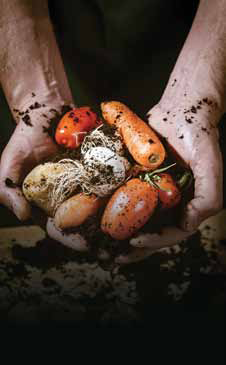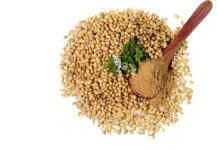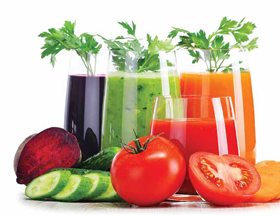
“Research proves organic is better”
Why Certified Organic is Safer for Your Health
There are more than 8000 pesticides registered for use by the Australian Pesticides and Veterinary Medicines Authority (APVMA).
The pesticides include herbicides, fungicides and insecticides. The concern researchers like RMIT University’s Professor Marc Cohen have is that regulators allowing pesticides dismiss the cocktail effects that might occur from multiple exposure from chemicals.
One of Prof Cohen’s studies found that eating a mostly organic diet for just one week reduced exposure to organophosphate pesticide residues by up to 90 per cent. This is a world-first study and they’re following it up with another, which is exploring the connection between pesticide residues and health on 14 to 16 years. Results are expected at the end of this year.
COCKTAIL EFFECTS DISMISSED
Prof Cohen said: “It is interesting that the regulators do not consider there is any advantage in reducing the levels of neurotoxic organophosphates and appear to dismiss any cocktail effects from multiple exposures.
“I’m involved in research at the moment that is attempting to answer the question: ‘Is eating less poison healthier for you?’
“Apparently no research has yet addressed this. The official government stance appears to be ‘no’, because the government considers that the levels you are currently eating are not ‘unhealthy’. There is no human data, however, to make an informed decision on this.â€
Prof Cohen said in the absence of this data, we should employ the precautionary principle and minimise our pesticide exposure by eating certified organic food.
Despite their prevalence pesticides, don’t undergo the same testing as pharmaceuticals. They are subject to little or no clinical trials or monitoring, there is no control over dosage over a lifetime and there is no monitoring on their health effects. It is not until a significant environmental or human health problem arises that a pesticide is withdrawn from the market.
THE PROBLEM OF FOOD ADDITIVES
Author of Chemical Free Kids and Australian Organic ambassador Dr Sarah Lantz said many additives permitted in foods today have not undergone safety testing for decades.
“Tests are rarely done to determine the effects of these substances on behaviour and learning abilities, or whether they cause intolerances or allergies,†Dr Lantz said. “It’s why artificial additives are prohibited from certified organic foods.
“Some additives are permitted in foods, despite their health compromising effects. Approximately 50 have been linked to cancer; 55 or so can trigger asthma; more than 30 are thought to cause hyperactivity and-or learning difficulties in children, and 80 may contribute to kidney or liver problems.â€
About 5000 additives find their way into our food as flavourings, colourings, artificial sweeteners, flavour enhancers, emulsifiers, thickeners, stabilizers, preservatives and propellants.
WHAT CERTIFIED ORGANIC MEANS
Being certified organic is about much more than being grown free from synthetic pesticides, herbicides, hormones, antibiotics and genetically modified organisms (GMOs): it’s also cruelty free, pasture fed, free range, biodiversity friendly.
So you don’t need to look for lots of labels, just look for one logo, like Australian Certified Organic (ACO) because it ticks all the boxes. Businesses certified with ACO undergo annual and spot audits to ensure they meet the Australian Certified Organic Standard – the rulebook for organic production.

ORGANIC IS MORE THAN ‘SPRAY FREE’
Be wary of claims like “chemical free†and “spray free†at markets. They don’t mean they’re certified organic.
Western Australian, Ray Simpson, grows about three hectares of certified organic vegetables. After seeing an increase in the number of stallholders at his local market promoting fruit and vegetables as spray free, curiosity got the better of him and he sent a sample of spinach from one of those stalls to AMAL Analytical, a lab that specialises in pesticide residue testing. The sample came back testing positive for DDE, a residue from DDT.
Mr Simpson said this would not happen in a regulated industry like organics, because soil tests are carried out on farms before they can begin the three-year journey to organic certification.
“In an organic system that’s the first thing that would have been picked up,†Mr Simpson said.
“It (chemical residue) wouldn’t be picked up in conventional agriculture where there’s no regulation.â€
Under the Australian Certified Organic Standard growers would not be able to plant crops in contaminated land. DDT was banned in the 1980s but it still persists in our soils.
So if you’re shopping at your local markets and you’re in doubt about whether a product really is certified organic, look for a recognised certification logo, or ask the stallholder for his or her certificate.
More than just food
These days you can buy almost anything certified organic, from tea and coffee, toothpaste and tampons to garden compost and seeds. October is Australian Organic Awareness Month and it’s about helping shoppers understand that there is more to organics than food.
One of the fastest growing organic sectors is skincare and cosmetics. There are thousands of synthetic chemicals used in skincare, hair care and cosmetics and given that our skin is our largest organ, anything we put on it goes into our bloodstream.
Australian Organic ambassador and health and wellness speaker Therese Kerr pointed out that it is cheaper for manufacturers to use synthetic ingredients rather than certified organic ones.
Ms Kerr said: “Fragrance is one of the most toxic things a woman can put directly on her skin and just about all personal, skin and hair care products not only contain the standard nasty ingredients like TEA’s, DEA’s, parabens, sulfates, glycols, artificial, synthetic, GM ingredients, nano particles, ethoxylates, formaldehyde and formaldehyde derivatives just to name a few, they also contain fragrance.â€
The range of certified organic cosmetics is getting larger thanks to companies like Nudus, which is breaking new ground with lipsticks. Certified organic concealers, blushes and other cosmetics are also available.
Because the Australian Certified Organic Standard was developed primarily for food and agricultural goods, more cosmetic companies are choosing to get certified under the COSMOS certification scheme, which was developed in Europe specifically for the cosmetic industry.
Get involved in October’s Australian Organic Awareness Month by following Australian Organic on Facebook, facebook.com/AustOrganicLtd.









































